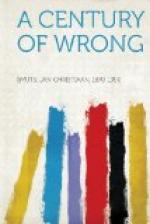[Sidenote: The cry of disloyalty]
Instead of honestly admitting that the Africander victory was the natural result of the Jameson Raid, the Jingoes began, not only in South Africa, but also in England, to shout that the rule and supremacy of England in South Africa was menaced.
[Sidenote: The Transvaal must be humiliated.]
They contended that South Africa would be lost to England unless energetic intervention took place without delay, and that this menace to English rule was due to the Republican propaganda which the South African Republic had set in motion. That as long as the South African Republic refused to humiliate itself before British authority, but on the contrary kept its youthful head on high with national pride, other parts of South Africa would be inclined to follow its example, and there would thus be no certainty for British supremacy in this quarter of the globe. The South African Republic would have to be humiliated and to be crushed into the dust; the Africanders in other parts of South Africa would then abandon their alleged hope of a more extensive Republican South Africa.
[Sidenote: The necessity for constitutional means.]
But how was this humiliation to be brought about, and how, above all, was it to be brought about by those “Constitutional means,” which, since the failure of the conspiracy, had become a sine qua non?
The new Governor of the Cape Colony and High Commissioner of South Africa, who had enjoyed the distinction of a brilliant university career, who had learnt humility and moderation at the feet of Mr. W.T. Stead, and who had learnt by his experience with the fellaheen in Egypt how to govern the descendants of the Huguenots and the “Beggars of the Sea,” would know very well how to evolve “Constitutional means” in order to humiliate the South African Republic, and to crush it into the dust.
[Sidenote: The suzerainty.]
There was at any rate the burning question of suzerainty, which the South African Republic had unconsciously and innocently raised in the following way:—
After the Jameson Raid the Volksraad had passed certain laws with a view of removing some of the causes of that movement, as, for example, the law by which dangerous individuals could be expelled from the State, and the law by which paupers and people suffering from contagious diseases could be prevented from entering the Republic.[33] These laws were declared to be in conflict with Article XIV. of the London Convention. Violations of Article IV. were also said to have taken place in regard to certain extradition and other treaties, which had been concluded between the South African Republic and Foreign Powers.[34] On the 7th May, 1897, the Government of the South African Republic dispatched a very important reply to these accusations, in which, after fully stating the reasons why the Government differed from Her Majesty’s Government, an appeal was made for arbitration as being the most suitable method of settling the dispute.




